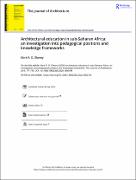| dc.contributor.author | Olweny, Mark R.O. | |
| dc.date.accessioned | 2020-11-12T06:48:46Z | |
| dc.date.available | 2020-11-12T06:48:46Z | |
| dc.date.issued | 2020-09-08 | |
| dc.identifier.citation | Olweny, M.R.O., 2020. Architectural education in sub-Saharan Africa: an investigation into pedagogical positions and knowledge frameworks, The Journal of Architecture, 25(6), pp.717-735. | en_US |
| dc.identifier.other | 10.1080/13602365.2020.1800794 | |
| dc.identifier.uri | http://hdl.handle.net/20.500.12280/2620 | |
| dc.description.abstract | Formal architectural education in sub-Saharan Africa was established in the 1920s, initially in South Africa, and later in Kenya and Nigeria during the 1950s. The first postcolonial schools in Ghana and Sudan were also inaugurated in the 1950s, triggering debates on the form architectural education should take for a postcolonial Africa. The origins of architectural education as a practice that was imposed across the region have had an unwavering impact on the current state of education in Africa. As the state of architectural education is increasingly discussed in global terms, the need to tell the story of sub-Saharan Africa
has never been more urgent. Although this is often obscured by discourse from other parts of the world, it remains especially significant in relation to growing debates on decolonising and transforming education. This article engages with discourses of architectural education in the context of sub-Saharan Africa. Drawing from a wider study of architectural education across the region, it offers crucial insights into the pedagogical positions and knowledge frameworks that have defined (and to an extent continue to define) how architectural education is perceived and practised. The article investigates historic and contemporary discourses of architectural education that are informed by the recognition that architecture is a sociocultural phenomenon.
The cases presented may further destabilise the status quo and the embedded hierarchies in architectural education. In the final instance, they are testament to a growing penchant for change, as they acknowledge alternative forms of knowledge and break from the hegemony of ahistoric educational approaches. | en_US |
| dc.language.iso | en | en_US |
| dc.publisher | Routlegde, Taylor and Francis group | en_US |
| dc.relation.ispartofseries | The Journal of Architecture;Volume 25 Number 6 | |
| dc.subject | Architecture | en_US |
| dc.subject | Architectural Education | en_US |
| dc.subject | Knowledge Frameworks | en_US |
| dc.subject | Pedagogical Positions | en_US |
| dc.subject | Sub-Saharan Africa | en_US |
| dc.title | Architectural education in sub-Saharan Africa: an investigation into pedagogical positions and knowledge frameworks | en_US |
| dc.type | Article | en_US |


